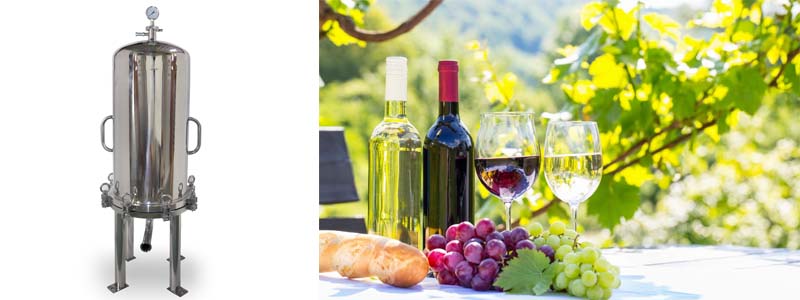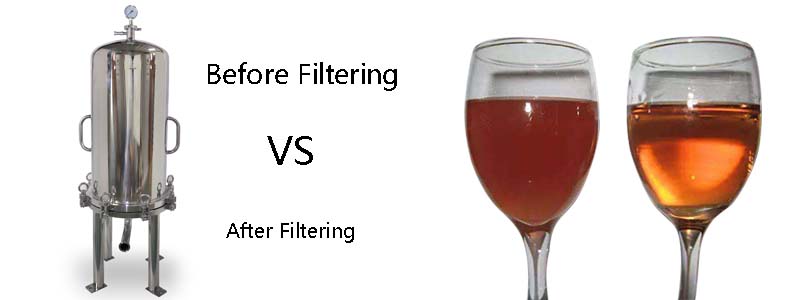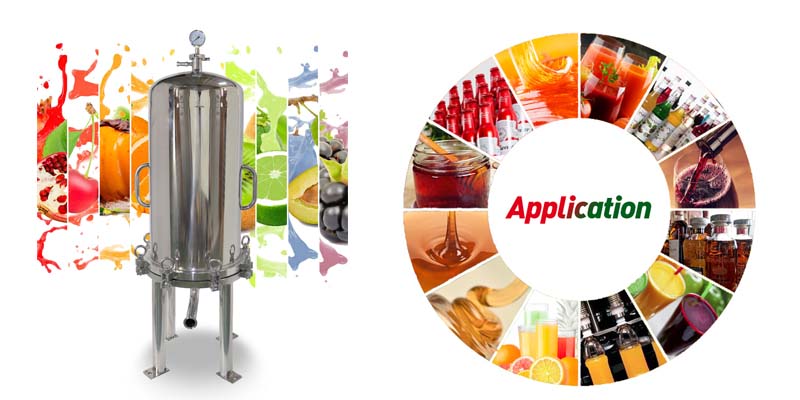There is a wide variety of wines, with different product styles due to different types of wines and manufacturing industries, and each wine has a special flavor quality. With the development of high-grade wine and high-quality development, higher requirements are put forward for wine clarification-prefiltration-sterilization filtration. After the wine is clarified, filtered and purified, there is no suspended matter, no turbidity, and pure color, keeping the taste and quality of the wine before and after filtration basically unchanged. So as to ensure the original style and taste of the wine.

Filter Purpose
● Filter out the yeast, microorganism and bacteria in the fermentation production process to realize aseptic filling.
● Absolute sterilization and filtration to ensure the quality of finished wine.
● Filter microorganisms such as yeast or bacteria in the wine body to improve the biological stability of the wine.
Filtration is the physical process of removing particulate matter by passing wine through a membrane. As we often mention in the taste of color, whether the appearance is clear enough is one of the important indicators to judge the quality of the wine. From this, it is not difficult to imagine that filtration can obviously make the wine clearer.
How to choose a lenticular wine filter?
When selecting a filter, the filter medium will directly affect the filtering capacity and filtering accuracy of the filtering equipment. In the field of liquid-solid phase separation, filter media such as filter cloth and filter screen are widely used. With the development of industry, the types and types of filters have also become various. According to its properties, the lenticular wine filter should meet the following requirements: high flow, stable structure, strong filtration capacity, reliability, durability, and some preservatives and other substances in the wine, so the filter has no or low adsorption and adhesion.

FBL lenticular wine filter has the advantages of high filtration accuracy, fast filtration speed, less adsorption, no media falling off, not easy to leak, acid and alkali corrosion resistance, convenient operation, etc. Recoil, any user's different needs can form two, three and four filters.
Application Field
At present, many wine, mulberry wine, bayberry wine, dragon fruit wine, blueberry wine, kiwi fruit wine, strawberry wine, green plum wine and other fruit wine production enterprises have been running stably for many years. In addition, the equipment can be widely used in the production of liquor, beer, rice wine, health wine, beverages, rice vinegar and other products.
Application Process
Traditional Craft:
Wine → Treatment → Diatomite Filtration → Cardboard Filtration → Microporous Membrane Filtration → Sake Tank → Foreign Matter Trap → Filling
New Technology:
Wine→Processing→0.2um Cross-Flow Membrane Filtration→Sake Tank→Foreign Body Trap→Filling
Application Advantages
1. Simplify the filtration process and directly save the equipment expenditure of the cardboard filter.
2. Simple and stable automatic operation, reduce labor, reduce labor intensity, and eliminate the influence of workers' operation level on product quality.
3. The filtration precision is better than the traditional process, which can significantly improve the clarity and make the fruit wine more glossy.
4. Filter out the colloidal particulate matter and macromolecular protein that affect the non-biological stability in the fruit wine, and solve the precipitation problem of the fruit wine.
5. It basically has no effect on the physical and chemical indicators such as effective alcohols, acids and dry extracts in fruit wine.
6. The wine industry applies mature equipment design and low operating cost, and its operating cost is only 30% of the traditional process, or even lower.
7. Sterilization filtration, close to 100% sterilization rate, and the product is more stable.
8. High flow, stable structure and strong filtration capacity, which can meet the filtration requirements in the large-scale production of wine.
9. The terminal filter has the reliability and durability of microbial control.
10. The filter has low adsorption, and has no adsorption and adhesion with substances such as preservatives in the wine production process.
FBL lenticular wine filter is a liquid sterilization-grade membrane filtration equipment developed for the material separation characteristics of small batch filtration but high filtration requirements. The equipment adopts the tangential flow process in which the liquid to be filtered is circulated to wash the surface of the membrane, which not only has high filtration accuracy, but also can adapt to liquid clarification and sterilization filtration with high concentration and turbidity.

FBL filter This equipment can be widely used in liquor, beer, rice wine, wine, health wine, beverage, rice vinegar, etc. The excellent filtration performance and simple filtration process exhibited by the equipment during the application process are especially suitable for the special separation requirements of small batches of materials. It is the first choice to replace traditional filtration equipment such as horizontal diatomite filters, cardboard filters and centrifugal separation. .
Almost all commercial brewers also filter their beer to quickly improve flavor and clarity. However, very few home brewers filter their beer, either because they lack the equipment or because they prefer the unfiltered flavor of their beer. FBL filter This device can also be used for home beer filtration, which is a good choice for families who need crystal clear, smooth-tasting home-brewed beer.
How to choose a lenticular beer filter?
First, you need to choose the filter size. The filter should be fine enough to filter out tannins and yeast cells, but not so fine that it will alter the flavor of the finished beer. About 1 micron is the best choice for filter size - less than 0.5 microns and you may filter out some flavors, while larger ones (5 microns and above) may leave yeast in the beer. In order to filter out the bacteria that some commercial brewers do for shelf stability, you need to get to 0.3 microns or less. I do not recommend home brewing below 0.5 microns.
The second is the speed at which the filter clogs. Many commercial brewers actually use two-stage filters. They start with a 5-micron filter to remove large particles, then use a smaller 0.5-micron in-line filter as a second stage to filter small particles. If you're on a big budget, you can do that too, but for a single filter, 1 micron is fine.
Beer filtration also has the advantage of removing very small impurities from the beer – even those that do not fall out of suspension during natural aging. The filter can remove particles as small as 1 micron and even smaller. This produces cleaner flavors and better clarity than natural aging.
The filter produced by FBL has stable performance and easy operation. In addition, we have stainless steel centrifuges and other wine, beer, juice production equipment. 13 years of production and export experience and a series of ISO9001 and CE certificates, with warehouses in the United States, Spain and Thailand.
If you want to know about our products, or want to buy our equipment, please feel free to contact us, FBL will provide you with the best prices for lenticular wine and beer filters.





